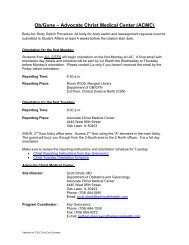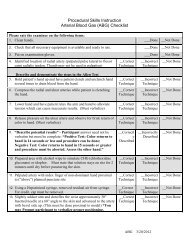a PDF version of the Full Hematology Oncology Curriculum
a PDF version of the Full Hematology Oncology Curriculum
a PDF version of the Full Hematology Oncology Curriculum
You also want an ePaper? Increase the reach of your titles
YUMPU automatically turns print PDFs into web optimized ePapers that Google loves.
6. Breast cancer<br />
7. Sarcomas<br />
a. Bone sarcomas<br />
b. S<strong>of</strong>t tissue sarcomas<br />
8. Skin cancers<br />
a. Melanoma<br />
b. Basal cell and squamous cell cancers<br />
9. Endocrine cancer<br />
10. Central nervous system malignancies<br />
11. Carcinoma <strong>of</strong> unknown primary site<br />
Overview <strong>of</strong> <strong>the</strong> Rotation:<br />
During this rotation, fellows work with an attending, one or more resident(s) and medical student(s) to<br />
<strong>of</strong>fer consultations in hematology and oncology. The consult team takes care <strong>of</strong> very sick and very<br />
complex patients. Over <strong>the</strong> course <strong>of</strong> <strong>the</strong> rotation, fellows see quite a significant number <strong>of</strong> new<br />
consultations and follow‐ups.<br />
II. Core Competencies and <strong>Curriculum</strong><br />
Teaching Methods / Clinical Encounters<br />
During this rotation, fellows evaluate inpatients referred to <strong>the</strong> H/O consultation service. This<br />
consultation service deals with all patients except those with sickle cell disease. Patients are first<br />
evaluated by one medical student, resident, or fellow, <strong>the</strong>n discussed when possible with <strong>the</strong> fellow, and<br />
finally presented formally to <strong>the</strong> attending and <strong>the</strong> rest <strong>of</strong> <strong>the</strong> team. Prior to <strong>the</strong> presentation, whenever<br />
a case is difficult, unusual, or challenging, fellows and residents will locate and print an article that<br />
addresses <strong>the</strong> problem being evaluated.<br />
This rotation values and emphasizes teaching. Frequently, every person on <strong>the</strong> team participates in<br />
teaching: attendings, fellows, residents, and medical students. Students who review <strong>the</strong> literature about<br />
one <strong>of</strong> <strong>the</strong>ir patients may present a short summary to <strong>the</strong> group. Students interested in hematology/<br />
oncology may chose to review an antibiotic or antibiotic group and present a short summary to <strong>the</strong><br />
group. Fellows teach during short lectures to <strong>the</strong> team usually when <strong>the</strong> attending is not present.<br />
Attendings teach both during sitting rounds (presentation <strong>of</strong> new consultations and follow‐up problems)<br />
and during walking rounds (at <strong>the</strong> bedside). They also present “mini‐lectures”, and more formal lectures<br />
on <strong>the</strong> topic <strong>of</strong> <strong>the</strong>ir choice. Frequently, <strong>the</strong> fellow or one member <strong>of</strong> <strong>the</strong> team will request a specific<br />
topic.<br />
28



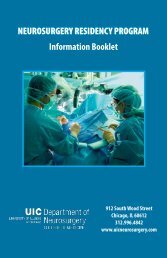
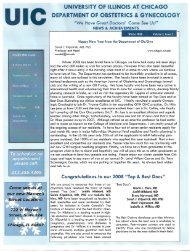
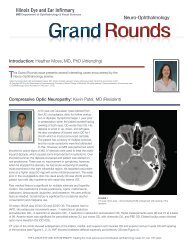
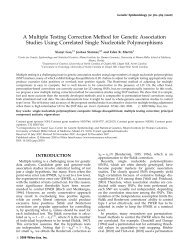
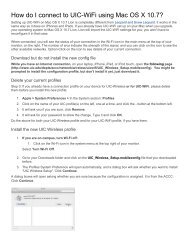
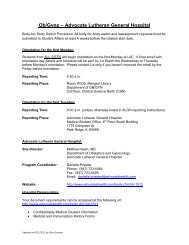
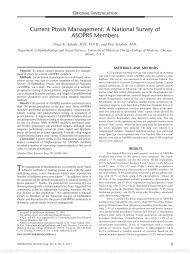
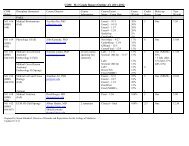
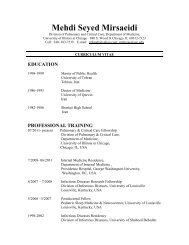
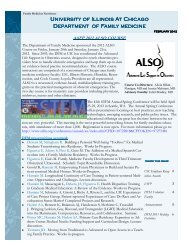
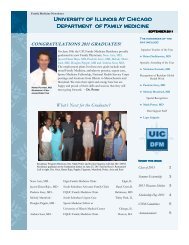
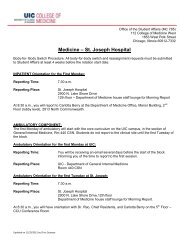
![CV Joan [W51] - University of Illinois College of Medicine at Chicago ...](https://img.yumpu.com/17336863/1/190x245/cv-joan-w51-university-of-illinois-college-of-medicine-at-chicago-.jpg?quality=85)
